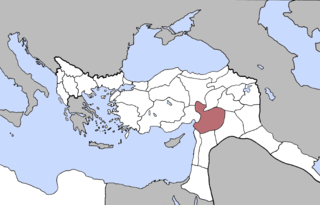 W
WThe Vilayet of Aleppo was a first-level administrative division (vilayet) of the Ottoman Empire, centered on the city of Aleppo.
 W
WThe Ayyubid dynasty was a Sunni Muslim dynasty of Kurdish origin, founded by Saladin and centered in Egypt, ruling over the Levant, Mesopotamia, Hijaz, Nubia and parts of the Maghreb. The dynasty ruled large parts of the Middle East during the 12th and 13th centuries. Saladin had risen to vizier of Fatimid Egypt in 1169, before abolishing the Fatimid Caliphate in 1171. Three years later, he was proclaimed sultan following the death of his former master, the Zengid ruler Nur al-Din and established himself as the first custodian of the two holy mosques. For the next decade, the Ayyubids launched conquests throughout the region and by 1183, their domains encompassed Egypt, Syria, Upper Mesopotamia, the Hejaz, Yemen and the North African coast up to the borders of modern-day Tunisia. Most of the Crusader states including the Kingdom of Jerusalem fell to Saladin after his victory at the Battle of Hattin in 1187. However, the Crusaders regained control of Palestine's coastline in the 1190s.
 W
WErbil or Hawler, known in ancient history as Arbela, is the capital and most populated city in Kurdistan Region in Iraq. It has around 1.5 million inhabitants, while Erbil Governorate has 2,932,800 inhabitants as of 2020.
 W
WKirkuk is a city in Iraq, serving as the capital of the Kirkuk Governorate, located 238 kilometres north of Baghdad. Kirkuk has a diverse population and experienced demographic changes during its urbanization in the twentieth century. Arabs, Kurds and Turkmens lay conflicting claims to the city.
 W
WThe Kurdistan Regional Government (KRG) is the official ruling body of the autonomous Kurdistan Region of northern Iraq.
 W
WThe Mosul Vilayet was a first-level administrative division (vilayet) of the Ottoman Empire. It was created from the northern sanjaks of the Baghdad Vilayet in 1878.
 W
WThe history of Syria covers events which occurred on the territory of the present Syrian Arab Republic and events which occurred in the region of Syria. The present Syrian Arab Republic spans territory which was first unified in the 10th century BCE under the Neo-Assyrian Empire, the capital of which was the city of Assur, from which the name "Syria" most likely derives. This territory was then conquered by various rulers, and settled in by different peoples. Syria is considered to have emerged as an independent country for the first time on 24 October 1945, upon the signing of the United Nations Charter by the Syrian government, effectively ending France's mandate by the League of Nations to "render administrative advice and assistance to the population" of Syria, which came in effect in April 1946. On 21 February 1958, however, Syria merged with Egypt to create the United Arab Republic after plebiscitary ratification of the merger by both countries' nations, but seceded from it in 1961, thereby recovering its full independence. Since 1963, the Syrian Arab Republic has been ruled by the Ba’ath Party, run by the Assad family exclusively since 1970. Currently Syria is fractured between rival forces due to the Syrian Civil War.
 W
WThe Sanjak of Zor was a sanjak of the Ottoman Empire, which was created in 1857. Some of its area was separated from the Baghdad Vilayet. Zor was sometimes mentioned as being part of the Aleppo Vilayet, or of the Syria Vilayet.